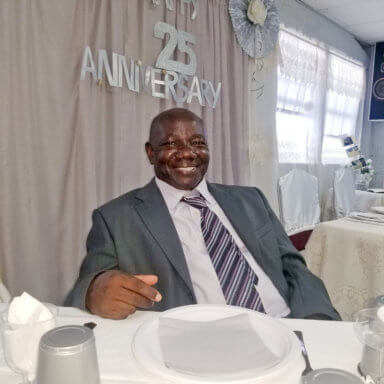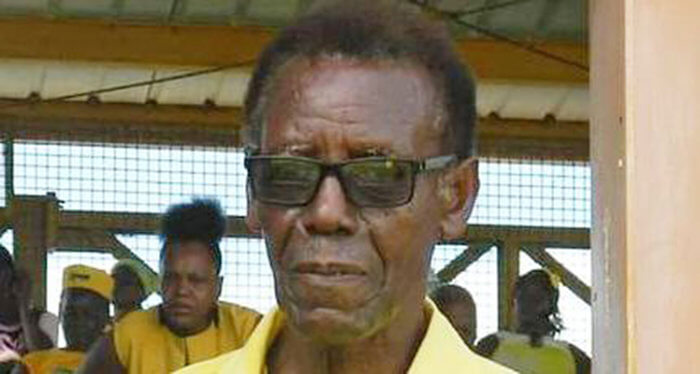Former ‘foot soldier’ tells late SVG Opposition Leader’s compelling story

Elrias “Errie” Williams — regarded as the “chief foot soldier” who, while still a student at the St. Martin’s Secondary School in St. Vincent and the Grenadines (SVG), became the youngest member of the New Rescuers Movement (NRM), headed by former SVG Opposition Leader Calder Williams — has told Calder’s compelling story during his official funeral at the New Testament Church of God, a Pentecostal church in the town of Chateaubelair in SVG.
Calder Williams died at his home in Chateaubelair on March 29 after a period of illness and hospitalization. He was 69.
With the attendance of Opposition Leader and President of the New Democratic Party (NDP) Dr. Goodwin Friday and other opposition parliamentarians and supporters, Speaker of the House of Assembly Rochelle Forde and former North Leeward Representatives Roland “Patel” Matthews and Dr. Jerrol Thompson, Williams – who currently serves as pastor at Christian Life Ministries in Cane Grove, Central Leeward – told mourners at the packed funeral service on April 29 that he was “extremely grateful for this opportunity to tell Calder’s story.”
“My association with the deceased gives me valid reasons to share my memory of him,” said Williams, also an evangelist at Christian Life Ministries, during the service that was broadcast live by the National Broadcasting Corporation (NBC) Radio 705 on the Internet, recalling that the NRM was the organization which served as “the political catalyst that propelled Calder Williams into electoral politics in North Leeward.”
He said he also worked with Calder, from 1980-1983, as his office administrator, in addition to serving as assistant general secretary of the Workers and Peasant Union (WAPU) and the youth coordinator of the short-lived Working Peoples Party (WPP) – both North Leeward-based organizations that Calder founded and was president.
Williams said Calder, affectionately called “Mr. Rep,” would be remembered as a national cricketer, police officer, teacher, community activist and, “most importantly, as a trade unionist turned into a prominent politician in St. Vincent and the Grenadines.”
He said Calder’s struggles against injustice began in the mid-1970s while serving as a police officer, quoting another former police officer as saying: “Calder organized a sick-out, where a number of them stayed in their rooms in the Barracks and called in sick for almost a month”.

Williams said Calder later resigned from the local constabulary and became a school teacher.
In 1974, he said Calder – along with 11 others, including Amos Glasgow, Giles Francois, Rill Ottley and the late Bennie Thompson – formed the NRM, which started out as a community development organization, with the motto: “To rescue the people from rural underdevelopment”.
Williams said NRM would later develop into a political organization, aligning with other “left wing” political groups, such as ARWEE in Diamonds and YOULIMO in Kingstown, the Vincentian capital, and that Calder’s political activism reached “new heights” during the famous November 1975 Teachers Strike.
He said Calder’s participation in the teachers’ strike resulted in his dismissal, along with two other NRM members, the late Bennie Thompson and Giles Francois.
Williams said Calder and the NRM then began intensifying their political activities, publishing the monthly Roots newspaper that was widely circulated in North Leeward.
He said the then Representative of North Leeward allegedly wrote a letter to the Court Registrar stating that “Calder Williams was a man of straw and had no means,” which was leaked to Calder by an unidentified worker.
Williams said Calder exposed the contents of the letter at a public meeting, resulting in his detention and “charged for stealing a letter from John’s Thompson’s office valued EC$25.00.”
“Calder was refused bail and slept on a window sill after the cell at the Barrouallie Police Station was deliberately flooded with water,” he said. “He was arrested again and placed in solitary confinement on remand in the notorious cell #24.”
As Calder and NRM continued “the struggle by exposing the plight of the people in North Leeward and forging links with other political organizations in the State,” Williams said they “took on the fight of the poor workers” on the Richmond Vale Estate, just outside Chateaubelair, forming (WAPU) in 1977.
Between 1977 and 1978, he said WAPU also started organizing estate workers at Belle Isle in North Leeward, and Walliabou and Keartons in the adjacent Central Leeward.
Williams said WAPU’s formation was “a key factor in the next stage of Calder’s struggles on behalf of the people of North Leeward,” with NRM deciding to enter electoral politics and choosing Calder, over Jim Maloney, as its preferred candidate in the 1979 general elections in St. Vincent and the Grenadines.
But, during the campaign, Williams said “a dramatic twist” occurred. He said while the NDP was introducing St. Clair Robinson as its candidate for North Leeward, the people of Chateaubelair and the adjacent Fitz-Hughes village demanded that Calder be the NDP candidate, shouting “No Calder, No Key,” the symbol of the NDP.
Ultimately, Calder was chosen as the NDP candidate, winning the North Leeward seat in the Dec. 5, 1979 general elections, with 1,448 of 3,094 valid votes cast, or 46.7 percent, in the four-way contest, becoming the first NDP candidate to successfully win an election on mainland St. Vincent.
But, after Calder’s triumph, Williams said more pressure was brought to bear on the people of North Leeward by the then incumbent administration.
He said he was the first victim of victimization by being fired as a teacher, in February 1980, from the nearby Petit Bordel Secondary School, after only five months on the job.
He also said that some workers at the Richmond Vale Estate, who were refused pay increase, were dismissed.
At the tender age of 26, Calder as appointed by-default to Leader of the Opposition after Mitchell’s gamble to contest the South Central Windward seat saw him out of Parliament until the by-election, in June 1980, following the resignation of Cosmos Cozier as the elected representative of the Grenadines Constituency, Williams said.
But, he said, there was strong mistrust of Calder within the upper echelons of the NDP, with NDP founder and leader, the late Prime Minister Sir James F. Michell, asking Calder to sign an “undated letter of resignation” as Leader of the Opposition, “which he did sign,” Williams said.
To avert the activation of the “undated letter of resignation” he said Calder wrote the Governor General, stating that any letter of resignation from him must have his signature twice.
In the interim, Williams said Calder continued the struggle with workers at the Richmond Vale Estate, with threats on his life, while on the picket line, including assassination attempts by a police officer, regarded as a “henchman” of the then St. Vincent Labor Party.
Williams said the estate workers and Calder even took their plight to Kingstown in a very strong show of solidarity, with the newly-formed National Committee for the Defense of Democracy, against the “Dread‟ Bills of 1981, which were eventually withdrawn.
In order to increase pressure on Calder’s supporters, Williams said the government closed down the Richmond Vale Estate, paid severance pay to “strike breakers” and supporters of the government, and later distributed the lands, “at very high costs, above the workers’ means, hence preventing most workers from acquiring the lands.”
Williams said that, while Calder, at one point, “threw his support behind the ULP (incumbent Unity Labor Party)”, on Sept. 7, 1997, Mitchell welcomed him back to the NDP fold at an NDP convention.
“Calder has never again left his beloved party and was chairman of the North Leeward Constituency Division up to his death,” Williams said. “In his later years, Calder lived a humble life, farming lands in Richmond and providing support to workers.
“Calder was a good man and, like all human beings, had made some mistakes for which the responsibilities must be placed solidly on his shoulders,” he added. “However, his contribution was very impactful, and many lives were improved by his work.”



